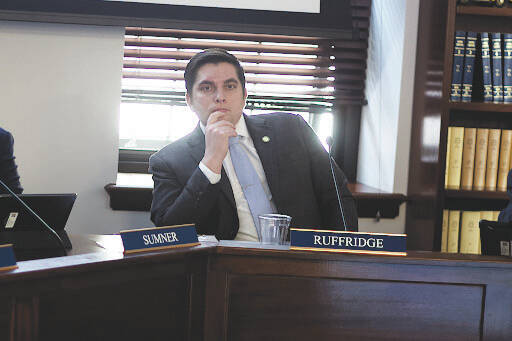KENAI — More Alaska students could become eligible to receive annual scholarships awarded by the state at higher amounts under a bill introduced by the Alaska House Education Committee last week.
House Bill 148 aims to boost the number of Alaskans that use the Alaska Performance Scholarship, awarded by the Alaska Commission on Postsecondary Education to pursue education after high school graduation, and would increase those scholarship amounts. Rep. Justin Ruffridge, a Soldotna Republican, co-chairs the House Education Committee with Rep. Jamie Allard, an Eagle River Republican.
The Alaska Performance Scholarship is awarded annually to high-performing, eligible high school students to help cover the cost of postsecondary education at participating colleges, universities or career and technical education programs in Alaska. Students who meet the requirements for the largest scholarship level receive $4,755 per year for four years, or up to $19,020.
To be eligible for the scholarship, recipients must be Alaska residents who graduate from an Alaska high school, have a minimum 2.5 grade point average, or GPA, take a rigorous course curriculum as outlined by the commission and meet a qualifying score on a college or career entrance exam.
The bill was presented to that committee on Monday by Ruffridge’s chief of staff, Bud Sexton, and Braeden Garrett, also part of Ruffridge’s staff. To date, more than $100 million in scholarships have been awarded to Alaska students, Sexton said Monday.
Among other things, H.B. 148 would eliminate the requirement that student applicants take a standardized test for consideration, such as the SAT or ACT, and implement a clearer notification process for applicants and their families. The bill would also increase the scholarship amounts for the first time since 2011.
Students with a 3.5 GPA or higher would receive the highest award level at $7,000 per year, up from $4,755. Students with at least a 3.0 GPA would receive $5,250 per year, up from $3,566 per year. Students with at least a 2.5 GPA would receive $3,500 per year, up from $2,378.
The bill would also implement a “step up” provision, through which a recipient’s scholarship award amount could go up if a student increases their GPA.
Sexton told committee members Monday, however, that the number of students taking advantage of the Alaska Performance Scholarship has steadily decreased since 2011. The program saw the lowest eligibility rates since its inception among 2022 graduates, when just 17% of graduates met the eligibility requirements.
In Juneau, 90 of 331 — 27% — Class of 2022 graduates were eligible for the Alaska Performance Scholarship, according to state data. Ten Juneau students in the fall of 2021 received scholarship funds totaling just shy of $18,000.
Alaska Performance Scholarship eligibility among Kenai Peninsula students in the last 12 years peaked at 40.4% with the 2020 graduating class — the only group not required to take a college entrance exam, such as the SAT or ACT, due to the COVID-19 pandemic.
Sexton reported to House Education Committee members Monday that removing the college entrance exam requirement from Alaska Performance Scholarship could open the program to more students. In Alaska, the number of high school seniors taking college entrance exams fell by about 26.8% from 2016 to 2017, the year after the State of Alaska stopped paying for those test fees.
Access to those tests is also limited in rural parts of Alaska, sometimes requiring travel to Anchorage, and can disproportionately affect underrepresented minorities and students for whom English is not their first language.
A survey of Alaska’s 2019 high school graduates by Northern Economics Inc. further found that 63% of graduates did not meet the standardized testing score requirements to be eligible for the scholarship. That’s as compared to the 60% of graduates who did not meet the high school curriculum requirement and 40% who did not meet the GPA requirement.
Rep. Mike Prax, a North Pole Republican, questioned whether eliminating the college entrance exam requirement undermined the original intent of the Alaska Performance Scholarship, which he said was to give an advantage to students who were already going to do well in postsecondary education.
“As I recall, the goal when this program was started was to do just that — give an advantage to those that were probably going to be more successful in the first place,” Prax said. “To get them to attend the University of Alaska, both to encourage them to stay in Alaska, but also to raise the, if you will, the prestige of the university system. Now, we’re proposing, coldly, to lower the standards to get that, so it’s sort of missing some of the original objectives.”
Rep. CJ McCormick, D-Bethel, said Monday that he appreciates the bill taking into consideration Alaska high schoolers in remote parts of the state, who may not have the same access to standardized tests like the ACT and SAT as students in Anchorage.
“I really appreciate the acknowledgement of some of the struggles that young people have in rural Alaska and not being able to travel out to Anchorage to take some of these exams,” McCormick said. “I just want to say that it’s really not an option for some people to travel somewhere to take one of these exams.”
• Contact reporter Ashlyn O’Hara at ashlyn.ohara@peninsulaclarion.com.

